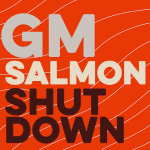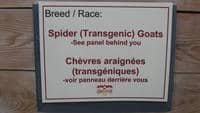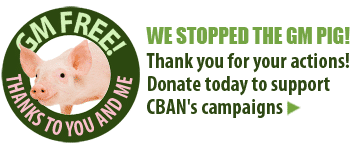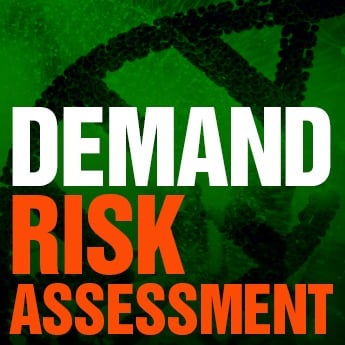GM Animals
Market Status
The world’s first commercialized genetically modified (GM or genetically engineered) food animal was a GM Atlantic salmon first sold in 2017 in Canada. However, production of this GM fish is suspended (2024).
On this page
The Issues
On October 4, 2016, CBAN testified at the House of Commons Agriculture Committee hearings on GM animals. All of the testimony can be read or listened to here.
Here is a summary of CBAN’s main recommendations to the Committee:
- There needs to be an assessment of economic impact before any GM product is approved for release
- There is a need to strengthen environmental risk assessment including a need to assess the long-term, system-wide risks of each GM product and the use of this technology as a whole
- Canada need systems for tracking and tracing all GM organisms
- Canadians need transparency in regulation
- Canadian consumers need mandatory labelling of all GM foods in the grocery store
We need to step back and ask:
- Is genetically engineering animals ethical?
- Is it acceptable to Canadians?
- Is it necessary?
There needs to be a moratorium on the introduction of GM animals until Canadians have a chance to be heard, and until changes are made to increase the government’s ability to regulate GM organisms and foods, including tracking and traceability, and transparency including mandatory GM food labelling.
Canada has two decades of experience with GM crops and foods that has not yet been evaluated. We need to step back so that we can also evaluate the impacts of GM crops. We need to do this and then learn and apply any lessons from the release of GM crops and foods before we consider allowing GM animals into our environment and food system.
The House of Commons Agriculture Committee study “Genetically modified animals for human consumption” made four recommendations:
- that the government provide greater transparency in the regulatory system that evaluates genetically modified animals intended for human consumption.
- that the government provide support for independent research into the health, environmental and other effects of new genetic modification technologies (including those to produce genetically modified animals).
- that the government support the mandatory labelling system only for issues of food health and safety.
- that the government work with industry to establish tools to provide traceability for genetically modified animals.
GM Fish
 December 2024: The production of genetically modified Atlantic salmon has ended. A genetically engineered (genetically modified or GM) Atlantic salmon was first sold in Canada In 2017, produced in Panama by the US company AquaBounty at an on-land pilot plant. The GM salmon was then produced (starting in 2021) at on-land facilities in Prince Edward Island (PEI), Canada and Indiana, USA, and both of these facilities are now closed (2023/2024) and the company has announced the end of its fish farming and the sale of most of its assets. The company had claimed that the GM salmon grows faster – it was genetically engineered with a growth hormone gene from Chinook salmon and genetic material from ocean pout (an eel-like creature). For details click here to visit our page on GM fish…
December 2024: The production of genetically modified Atlantic salmon has ended. A genetically engineered (genetically modified or GM) Atlantic salmon was first sold in Canada In 2017, produced in Panama by the US company AquaBounty at an on-land pilot plant. The GM salmon was then produced (starting in 2021) at on-land facilities in Prince Edward Island (PEI), Canada and Indiana, USA, and both of these facilities are now closed (2023/2024) and the company has announced the end of its fish farming and the sale of most of its assets. The company had claimed that the GM salmon grows faster – it was genetically engineered with a growth hormone gene from Chinook salmon and genetic material from ocean pout (an eel-like creature). For details click here to visit our page on GM fish…
GM Insects
November 8, 2023 – Press Release: Expert Panel Commissioned by Health Canada Urges Caution on Gene-Edited Insects for Pest Control. The Council of Canadian Academies (CCA) released an Expert Panel report commissioned by the Pesticide Management Regulatory Agency of Health Canada on the regulation of genetically engineering (genetically modified or GM) insects for pest control. The report focuses on the question of releasing gene-edited insects and “gene drive” organisms in particular, designed for release into the environment with the purpose of replacing or changing whole insect populations in the wild. The Expert Panel concludes that the complexity and uncertainties of using such genetically engineered insects (genetically modified organisms or GMOs) raise profound questions and require serious attention from the federal government. CBAN, Vigilance OGM, Friends of the Earth Canada and Nature Canada are calling on the federal government to respond seriously to the Panel’s recommendations by recognizing the uncertainty and complexity that accompany proposals to release GMOs into the environment, including the need to engage the public and the expertise held in civil society. The groups are asking the government to ensure that no genetically engineered organisms are approved for release into the wild, for pest control or other purposes.
GM Pigs
April 2025: The US Food and Drug Administration approved a gene-edited pig for human consumption, though it will not be in the market for a few years (if at all). The “Pig Improvement Company” or PIC, based in the UK, says it is seeking approval in Canada and in other US export markets such as Mexico and Japan. The company genetically engineered the pigs using the gene-editing technique of CRISPR, to make the pigs resistant to the common PRRS virus. The GM pigs are claimed to be resistant to most but not all strains of the PRRS virus circulating today.
December 2020: The US Food and Drug Administration approved a gene-edited pig for use in both medicine and food. Revivicor’s “GalSafe” pigs were genetically engineered to eliminate the sugar alpha-gal, which can cause allergic reactions in some people and makes pig organs unsuitable for transplants. The company does not sell the pigs as food but reportedly provides meat on request.
Enviropig™
In 2012, the genetically modified (GM or genetically engineered) pig called “Enviropig” has been shut down thanks to CBAN and your action. Thanks to your support and actions we have stopped the GM Pig!

Breed/Race: “Spider (Transgenic) Goats”
GM Goats
In 2013, the Canada Agriculture Museum in Ottawa removed genetically engineered goats from display after public pressure.






